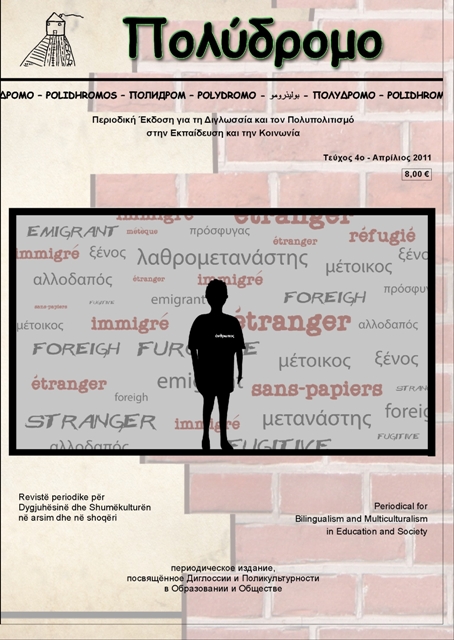Bilingualism is not just ‘trendy’
The fourth issue of Polydromo emerges within a wider context of restructuring in Greek education and society but also within a particularly sombre climate regarding issues of migration which relate in various ways to education, language maintenance or language shift, as well as bilingualism and multiculturalism in Greek society and elsewhere.
Our involvement with bilingualism,or, rather, with multilingualism in education does not stem from the fact that multilingualism and multiculturalism are presently considered ‘trendy’ areas in international linguistic and education research. Bilingual education and the promotion of multiculturalism are already commonplace both in research and in attempts at restructuring education policies and practices as a result of increased migration, ‘globalization’, etc. This has led to theoretically and epistemologically shaky, slogan-like approaches along the lines of ‘let’s all be multicultural’- an inevitable repercussion of the equally inevitable links between education research and ideology since educational practice translates directly into political practice.
As can be seen in its activities to this date, Polydromo as a group and periodical, acknowledges the fact that bilingualism, multilingualism and multiculturalism are profoundly ideological issues by definition. However, our joint efforts as linguists and educators is, crucially, imbued by attempts to create “bridges” between bilingualism and general principles of critical pedagogy and critical literacy.
Furthermore, we believe that the aim of education is to create persons who are responsible for their own learning, who are not mere recipients of knowledge but are able to contribute to the ways in which school knowledge is constructed and to adopt critically-oriented approaches to such knowledge. We believe that learning is more effective when it builds upon pre-existing or alternative sources of knowledge and skills, which may come from varying contexts, communities of practice, linguistic and ‘textual’ communities, etc.
One reason is that the comparison of knowledge and literacy practices promoted by mainstream education is a cognitivelydemanding process, which necessarily brings forward and cultivates metalinguistic and metacognitive skills. Moreover, such a comparison provides the necessary space for the cultivation of such skills, as it may contextualize new knowledge with knowledge that is already familiar.
How all the above relate to bilingualism / multilingualism in education is clear. We support respect towards and utilization of the languages and varieties present in the classroom, however not for ‘psychological’ reasons or because language is a value unto itself, or even because there is some ‘natural’ link between language and national, ethnic or other identity. We support the utilization of multilingualism due to the fact that the socially contextualized pedagogical treatment of language(s) provides the basis for (a) the cultivation of complex linguistic skills and (b) the cultivation of composite critical literacy skills. These allow people to assume responsibility for their learning, to compare and contrast what they are learning and to ‘speak’ the language of power and hegemony rather than allowing it to ‘speak’ them.
The above issues will be at the center of discussion during the 1st International Conference ‘Crossroads of Languages and Cultures: Learning Outside the School’, which is organized by Polydromo in collaboration with the Aristotle University of Thessaloniki, the University of Thessaly and PRAKSIS, on 8-10 April 2011, at the Tower of the School of Education of the A.U.TH. The closing session will make special reference to Arabic culture within and outside of Greece, which will involve a discussion of linguistic, social, political and religious issues, a discussion particularly relevant in the context of the recent bloody quest for a new political order in our neighboring Arab countries.
The Polydromo Editorial Board
Aspa Chatzidaki, Vasilia Kazoulli, Eleni Skourtou, Stavroula Tsiplakou, Roula Tsokalidou






